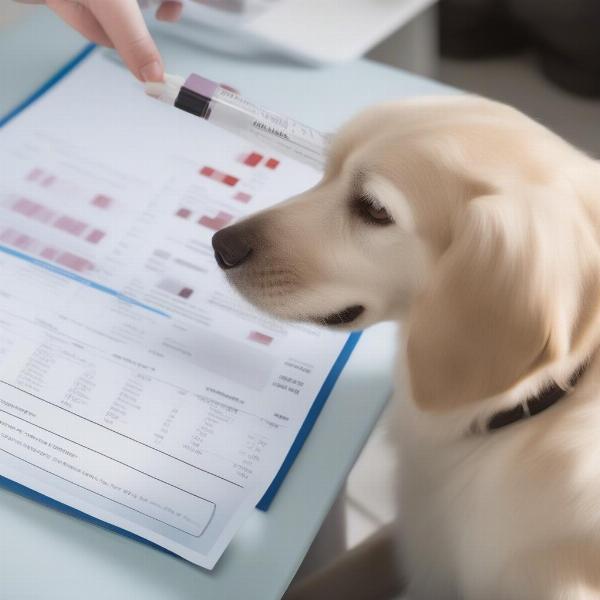Low creatinine levels in dogs can be a puzzling finding, often leaving owners with more questions than answers. While high creatinine is usually a cause for concern, signaling potential kidney issues, low creatinine isn’t always a clear indicator of a problem. This article will delve into the possible causes of low creatinine in dogs, when you should be concerned, and what steps to take if your dog has been diagnosed with this condition.
What Does Creatinine Tell Us About a Dog’s Health?
Creatinine is a waste product produced by muscles and filtered out of the bloodstream by the kidneys. Measuring creatinine levels helps veterinarians assess kidney function. Typically, a higher level indicates impaired kidney function, as the kidneys are struggling to remove the waste product effectively. However, low creatinine can sometimes point to other underlying health issues.
 Dog Blood Test Showing Low Creatinine
Dog Blood Test Showing Low Creatinine
Causes of Low Creatinine in Dogs
Low creatinine can be attributed to several factors, some more serious than others. These include:
- Low muscle mass: Dogs with reduced muscle mass, perhaps due to aging, malnutrition, or certain diseases like Cushing’s disease, naturally produce less creatinine. This is often the most common and least concerning cause.
- Liver disease: The liver plays a role in creatinine production. Liver dysfunction can sometimes lead to lower creatinine levels.
- Pregnancy: Pregnant dogs may have lower creatinine due to increased blood volume and changes in metabolism.
- Certain medications: Some medications can interfere with creatinine production or measurement.
- Laboratory error: Although less common, errors in sample handling or analysis can sometimes result in inaccurate readings.
When Should You Be Worried About Low Creatinine?
While low creatinine in itself isn’t always a cause for alarm, it’s important to consider the bigger picture. If your dog is showing other symptoms like lethargy, loss of appetite, vomiting, or increased thirst, it’s crucial to consult your veterinarian. These symptoms, coupled with low creatinine, could indicate an underlying health condition requiring further investigation.
Diagnosing the Underlying Cause of Low Creatinine
If your dog’s creatinine is low, your veterinarian will likely recommend additional tests to determine the underlying cause. These may include:
- Complete blood count (CBC): To evaluate overall health and identify any signs of infection or anemia.
- Blood chemistry panel: To assess liver and kidney function, as well as other important metabolic parameters.
- Urinalysis: To examine the urine for abnormalities that could indicate kidney or bladder issues.
- Imaging tests (X-rays, ultrasound): To visualize the internal organs and identify any structural abnormalities.
Treatment and Management of Low Creatinine in Dogs
Treatment for low creatinine focuses on addressing the underlying cause. If the low creatinine is due to low muscle mass, your veterinarian may recommend a diet higher in protein and specific exercises to build muscle. If liver disease is suspected, treatment will focus on managing the liver condition. low creatinine in dogs can be a symptom of several conditions.
Conclusion
Low creatinine in dogs requires a thorough investigation to identify the underlying cause. While not always a serious issue, it can sometimes indicate other health concerns. By working closely with your veterinarian and following their recommendations for diagnostics and treatment, you can ensure your dog receives the appropriate care and support. dog tremors kidney failure is a serious condition, though unrelated to low creatine, that you should be aware of.
FAQ
- Is low creatinine in dogs always bad? Not necessarily. It often simply reflects low muscle mass, which isn’t inherently harmful.
- What are the common symptoms associated with low creatinine? Low creatinine often doesn’t have specific symptoms. However, accompanying symptoms like lethargy, loss of appetite, or vomiting warrant veterinary attention.
- How is low creatinine treated? Treatment depends on the underlying cause, ranging from dietary changes to managing specific diseases.
- Can low creatinine be a sign of kidney disease? While high creatinine is a common indicator of kidney problems, low creatinine isn’t usually associated with kidney disease.
- What tests are used to diagnose the cause of low creatinine? Common tests include CBC, blood chemistry panels, urinalysis, and imaging tests.
- How can I help my dog if they have low creatinine? Follow your veterinarian’s recommendations for treatment and management. This may include dietary changes, medication, or other supportive care.
- Should I be concerned if my senior dog has low creatinine? Low creatinine in senior dogs is often attributed to age-related muscle loss and may not be a cause for concern. However, it’s always best to discuss any changes in your dog’s health with your veterinarian.
ILM Dog is your trusted source for expert advice on dog care and wellbeing. We cover everything from breed selection and health to training and nutrition. Whether you’re a seasoned dog owner or just starting out, we offer valuable resources to help you provide the best possible care for your furry companion. Our expertise extends to topics such as dog urine stain on hardwood floor and dogs urine stinks. Contact us at [email protected] or +44 20-3965-8624. ILM Dog is here to support you every step of the way. dog and cat management board is another topic that may interest you.